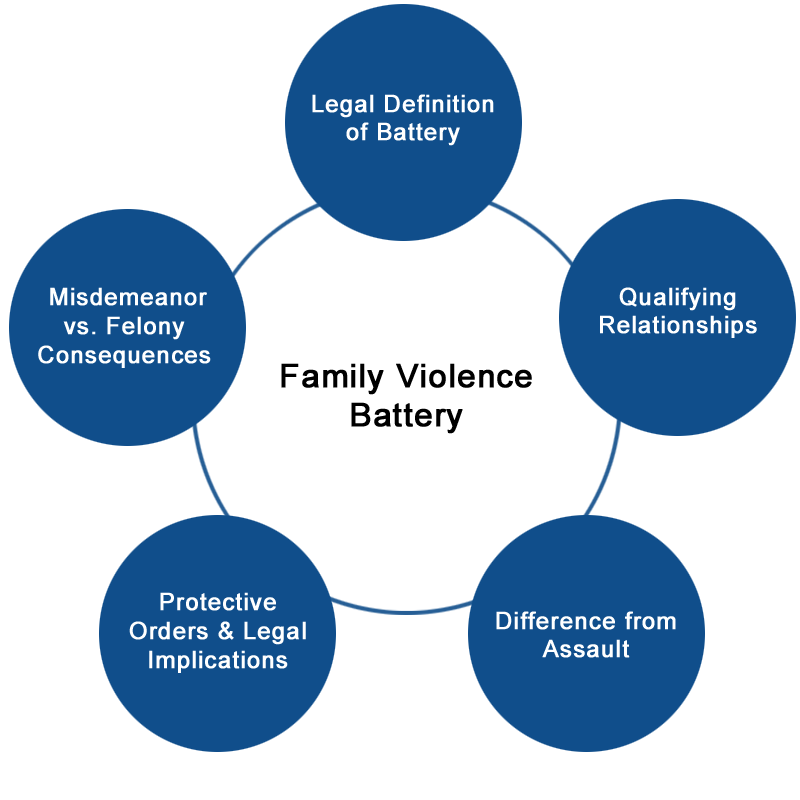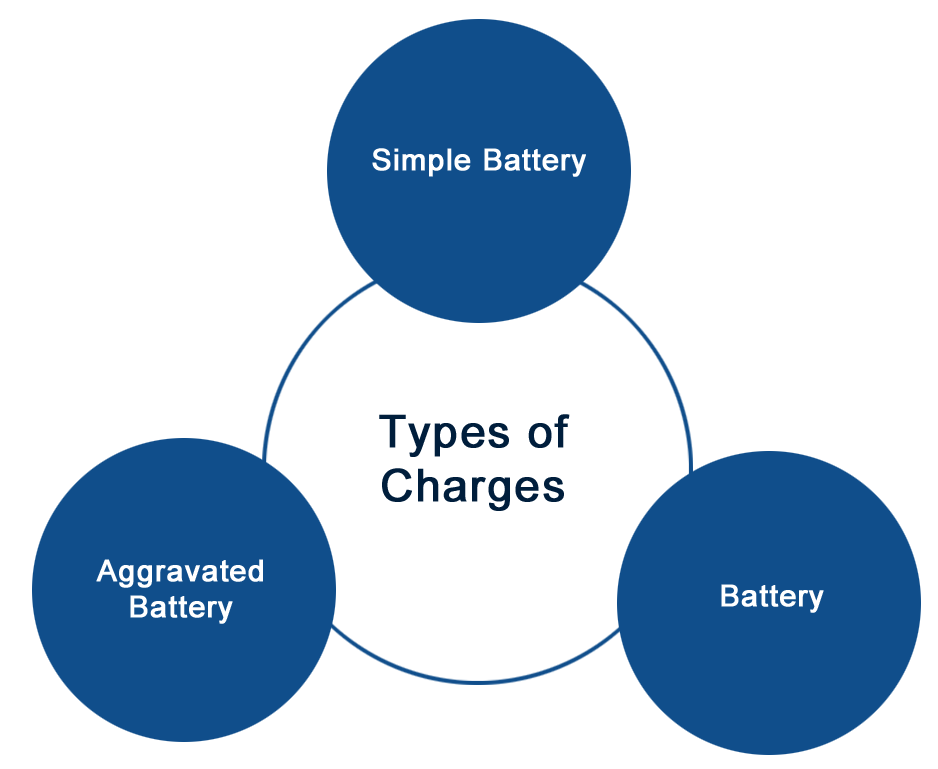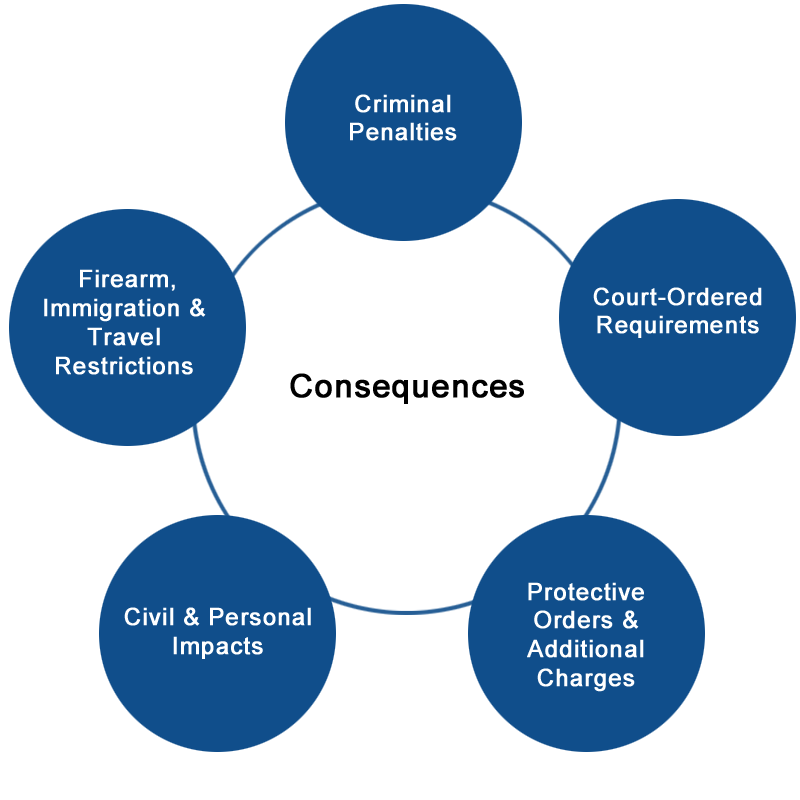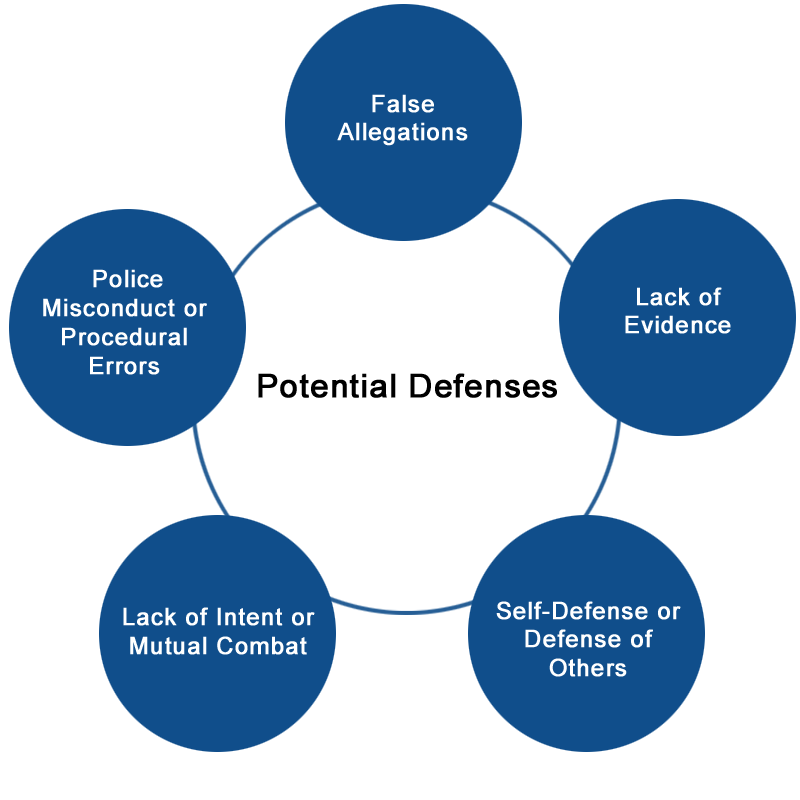As outlined in Georgia Code O.C.G.A. § 16-5-23.1, the act of battery itself occurs when “he or she intentionally causes substantial physical harm or visible bodily harm to another.” This differentiates it from assault, which involves threatening or attempting to cause harm without physical contact. While a charge of Family Violence Battery requires the same level of physical or visible harm, it pertains specifically to cases where the battery occurred between members of the family or those cohabitating. This can include:

- Current or former spouses
- Individuals who are co-parenting a child
- A parent and a child
- Stepsiblings or stepchildren
- Those living in a foster home, either as parents or children
- Those who either currently or formerly shared the same household
The primary difference between these two charges lies in the relationship between the victim and the accused as outlined above. The domestic nature of the offense means that protective orders may be invoked to restrict contact, and there may be additional legal considerations.
One important aspect of Family Violence Battery charges is that the charges cannot simply be dropped because the victim decides so. Regardless of the alleged victim’s wishes, police and prosecutors can and will pursue charges after an arrest if there is any evidence to support the initial allegations. Another important aspect of Family Violence Battery and standard battery is that a first conviction may be treated as a misdemeanor, but a second conviction will automatically be considered a felony regardless of the circumstances.
Can Family Violence Charges Be Dropped?
As stated, Family Violence Charges cannot be dropped by the victim. As long as the prosecution feels they have sufficient evidence to proceed, they will. That said, a capable attorney, aided by a strong defense built on solid evidence, can often see charges dismissed or reduced.

How Serious Are Family Violence Battery Charges?
The severity of the consequences for Family Violence Battery charges will depend greatly on several factors, including the gravity of the resulting injury, the accused’s criminal history, and the relationship between the parties. For charges of simple battery, the escalation of charges is as follows:
- Simple Battery: incidents that involve minor physical contact or offensive touching.
- Battery: incidents that result in visible injuries, such as swelling, bruising, or lacerations.
- Aggravated Battery: incidents that result in permanent loss of function, disfigurement, or other serious injury.
Aggravated Battery, as outlined in O.C.G.A. § 16-5-24, carries much greater penalties than simple battery and is always considered a felony.
Let’s take a look at a few example scenarios to see what kind of charges each might result in.
Two spouses, parents of multiple children, are engaged in a heated argument. In a moment of anger, one spouse slaps the other, leaving a visible mark. This would be construed as misdemeanor Family Violence Battery equally between those two spouses as it would between two former spouses, two unmarried partners who share a child, or even roommates. In any of those cases, the physical and visible injury would qualify as battery. Should the confrontation escalate, say if one party were to throw an object at the other resulting in severe injury, it could be treated as aggravated battery, which is a felony.
There are circumstances in each of these scenarios that could lead to additional charges. Strangulation, for example, can lead to felony aggravated battery. So can a second offense. If the incident occurs in full view of children, or if the victim is elderly, or if one individual has a restraining order against the other, there can be greater penalties.
How Long Does a Victim Have to File Domestic Violence Charges in Georgia?
Under Georgia law, the amount of time after the initial incident in which you have to file charges is known as the statute of limitations. For criminal charges, which are brought against the accused by the state, this statute of limitations is two years. For charges in civil cases, in which the victim sues the defendant for damages, this statute of limitations is extended to four years.
These statutes exist to ensure that evidence is preserved, but the safety and well-being of your family should always come first. If you feel you are at risk, reach out to a professional or a trusted support system for guidance and protection.

What Are The Consequences of a Family Violence Battery Conviction?
A first conviction of Family Violence Battery, being a misdemeanor, will lead to fines up to $1,000 and/or up to a year in jail. As a felony, second and subsequent convictions will result in up to five years in prison and much higher fines. On top of that, specific circumstances of the case could yield additional penalties and consequences, including:
- Possible probation, with incarceration for failure to comply
- Mandatory counseling, anger management, drug and alcohol counseling, behavioral therapy, or batterer’s intervention programs.
- Issuance of a temporary protective order (TPO) against the victim’s home, school, or workplace, with additional charges including felony aggravated stalking resulting from breaking the order. This can be made to last up to three years or longer.
- Mandatory community service
- Restriction of firearm rights, including a lifetime ban on firearm possession under Federal law, 18 U.S.C. § 922(g)(9). Those convicted may be required to surrender their firearms.
- Restrictions on travel and immigration
- Potential deportation for non-U.S. citizens, even legal residents
- Restitution payments to the victim
- Difficulty securing housing, employment, or professional licenses
- Negative impact on child custody or divorce proceedings
What Are The Potential Defenses for Family Violence Battery?
While Family Violence Battery is a serious charge and one that is pursued vigorously by prosecutors, there are any number of ways to have your charges reduced, dismissed, or acquitted altogether. These include:
Claiming False Allegations: Showing that the accusations were fabricated as an act of revenge, out of anger, or in hopes of gaining leverage in divorce or custody proceedings. This will require witness testimony, inconsistencies in the accuser’s statements or evidence such as text messages.

Demonstrating Lack of Evidence: The onus lies on the prosecution to prove guilt beyond a reasonable doubt. Showing a lack of physical evidence or credible witnesses can severely weaken their case. In addition, Georgia law requires substantial physical harm for a conviction of battery. If these injuries are minor or don’t exist, charges could be dismissed or reduced.
Showing Self-Defense or Defense of Others: Supported by evidence and documentation of past incidents, this defense aims to show that the defendant only used a proportional amount of force to defend themselves or others from harm.
Illustrating Lack of Intention: There are several ways to show this, either demonstrating that the injury resulted from an accident or incidental contact or by proving that the two parties were willingly engaged in mutual combat at the time of the incident.
Proving Improper Police Work: There are a number of procedural errors that law enforcement may have made during the arrest, from failing to read Miranda rights to acting with bias, any of which can result in a dismissal or expose flaws in the prosecution’s case. In addition, evidence collected through illegal search and seizure could be suppressed.
A comprehensive, independent investigation can help dismiss, reduce, or acquit charges. This includes reviewing police reports, bodycam footage, video/audio recordings, test results, and court documents.
Zeliff | Watson Can Help Get Your Charges Dismissed, Reduced or Acquitted
If you’ve been arrested for Family Violence Battery, you have rights. Protecting those rights is our primary goal, and we’ll stop at nothing to ensure your permanent criminal record stays clean.
The fight begins with a free, no-obligation legal consultation to discuss your case confidentially under attorney-client privilege. With all the facts of your case at hand, we dig deeper with a comprehensive, independent investigation that tracks down key witnesses and important evidence to strengthen your defense. By reviewing police reports and bodycam footage, revisiting the scene, and examining every piece of evidence, we find all the flaws in the case against you to give you the best possible outcome.
Call today to schedule your free legal consultation.
A Simple Process to Getting Started

Schedule a Free Case Evaluation
Schedule a free, no-obligation, and confidential case consultation in person, online, or over the phone. This will help you understand how your case can be challenged, potentially leading to a reduction, dismissal, or acquittal of your charges. Click here to schedule your case evaluation.

Meet Our Defense Team and Conduct a Case Evaluation
During your free case evaluation, you’ll have the opportunity to ask questions, receive answers and legal guidance, and collaborate with our attorneys to better understand your side of the story, gather evidence, and devise a strategy to achieve the best possible outcome for your pending criminal charges.

Start Defending Your Case
After your free case evaluation, Zeliff & Watson will assist in preserving evidence and safeguarding your rights, ensuring your protection throughout the process. The defense team will also provide a proposed fee to represent your case, with the goal of achieving the best possible outcome.

